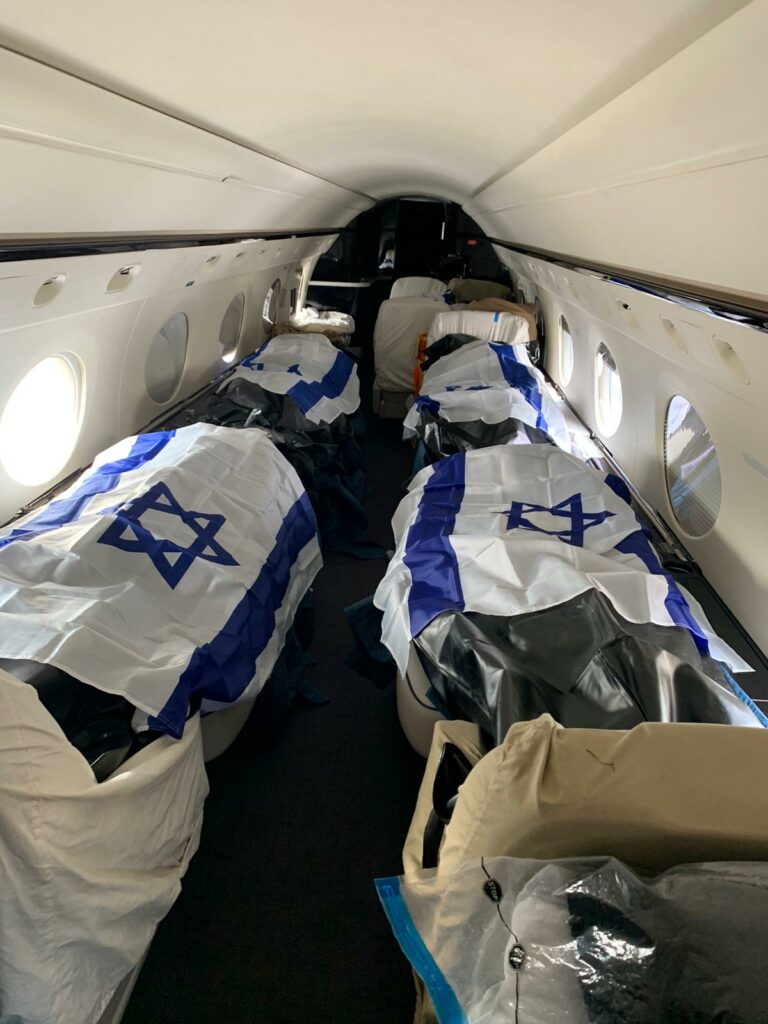Air travel to Israel has come to a near standstill due to coronavirus restrictions, but one type of voyage still endures: the final journey of Jews wishing to be buried in Israel.
For centuries, Jews have sought to be interred in the Holy Land, going to great lengths to secure their final resting place in the land of their biblical forefathers. Today, not even a once-in-a-century pandemic is halting this ancient last wish.
“The Land of Israel is a very special place for Jewish people to be buried,” said Rabbi Michoel Fletcher, who facilitates purchases of burial plots in Israel for Jews from abroad. “The flights have been reduced heavily, but there are cargo flights. So it may take a bit longer, but we are getting people coming in.”
Despite the challenges presented by the coronavirus, families, the aviation industry and health workers are finding ways to keep the deceased flying in — chartering private planes, adding cargo flights and striking deals with handling companies. Israel’s Foreign Ministry said 300 bodies, including many COVID-19 victims, have been flown in for burial since February.
During that time, Israel’s typically bustling Ben-Gurion International airport has become a ghost town, with only a few hundred passengers arriving on a handful of flights each week.
Jews have long aspired to be buried in the Holy Land. The biblical forefather Jacob and his son Joseph both requested to be buried in the Promised Land after having died in Egypt. Some Jews believe that being buried in the Holy Land grants atonement for sins or will make resurrection easier when the Messiah comes.
Israel has managed to keep the coronavirus crisis largely in check, and though it has reported 225 deaths out of more than 16,100 cases, it has not seen hospitals or morgues overwhelmed. More than half of the reported cases in Israel have recovered.
The virus causes mild to moderate flu-like symptoms in most patients, who recover within a few weeks. But it is highly contagious and can cause severe illness or death, particularly in older patients or those with underlying health problems.
Bringing in bodies is complex and costly, even under ordinary circumstances. Purchasing a plot can cost anywhere from a few thousand to tens of thousands of dollars, depending on the location. Many choose to spend hefty sums for a prime spot in Jerusalem’s Mount of Olives cemetery, which overlooks the storied Old City and its important Jewish sites. Additional costs include flights and transport from the airport to the cemetery.
Those who choose to be buried in Israel must also navigate a web of bureaucracy, starting with handling companies at their departure point to their local Israeli consulate or embassy as well as the Israeli Health Ministry.
The coronavirus crisis has complicated an already onerous process. While families typically fly in from abroad to escort the body and attend the funeral, that’s not possible under current travel restrictions, which require a two-week quarantine for anyone entering from abroad.
Extra measures are required to prevent contagion, including additional wrapping material and a separate ritual purification process. In hard-hit New York, which has a large Jewish community, some handling companies have refused to deal with the bodies of those who have died of COVID-19, the illness caused by the virus.
Last month, Dan Leshem’s father Amnon died from the coronavirus in Belgium, his home for the last 20 years. The bureaucracy and high costs were not a deterrent to bringing his father for burial in Israel, where Leshem lives.
“His last wish was to be buried in Israel,” said Leshem, who streamed the funeral to relatives and friends abroad. “It was clear that we must bring him.”
An Israeli aviation official, speaking on condition of anonymity because he wasn’t authorized to discuss the process of transporting bodies with the media, said a cargo flight that comes from Belgium five times a week brings in about 20 bodies a flight — “an exceptional amount.”
Most come from France, which has a large Jewish community and a severe outbreak, the official said. He said a weekly cargo flight from New York also brings in bodies but often can’t meet families’ needs, as Jewish custom requires burying the dead promptly.
Fletcher, the burial facilitator, said many in New York have opted to bury their dead in the U.S., intending to exhume the bodies once flights to Israel resume.
But solutions are being found even now. The aviation official said that even if a cargo flight is full, room will be made for the caskets. “We will not delay bodies because there is no space,” he said. Additional cargo flights are expected to be added in Europe, he said.
Wealthier families have hired private planes, which have been shipping in bodies about every other day from Europe and the U.S. In a photo released by ZAKA, an Israeli medical service, the sleek, slim interior of a private jet that had recently touched down was packed with four wooden caskets.
Israeli airline El Al struck a deal last week with a handling company in New York prepared to process the bodies of people who have died of the coronavirus.
Yossi Landau, a ZAKA official who has been assisting families with burials during the outbreak, said dignity for the dead, and the bereaved, was a main driver behind getting the bodies to Israel.
“Behind every person who dies there is also a family, people who are living,” said Landau. “They must be respected.”
(AP)











